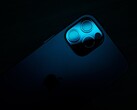iPhone displays have not been OLED for very long, although their origins are already strongly associated with LG or Samsung. However, there is an additional source of these high-end mobile panels, and that is BOE. Its links to Apple as a supplier might help with its increasing familiarity as a name in the panel-tech arena.
However, according to South Korean industry blog TheElec, this relationship may have hit a roadblock. It seems Apple (an OEM accustomed to a high level of input and control over the component orders it commissions) has found out that BOE has gone ahead and made a change to the OLED panels reportedly destined for new-made 6.1-inch iPhone 13 units without consulting its Cupertino-based client beforehand.
This alteration apparently consists of not much more than a slight change to the width of an integrated circuit (IC) associated with the iPhone 13 display's thin-film transistor (TFT) layer. However, this transgression is reportedly enough to flout Apple's exacting standards, resulting in an impasse leaving BOE's 13-series OLED production line inactive since February 2022.
There are alternative explanations for this stoppage at BOE, however, such as alleged plans on Samsung's part to lock other players out of the OLED game by leveraging its intellectual property relating to the technology. To date, there is no word on whether this apparent disruption in panel supply will affect plans for new iPhone production in the second quarter of 2022.
In any case, TheElec believes that BOE is in little danger of being let go as an Apple supplier on a permanent basis: the hardware giant is likely to keep them on as a partner, even if just as leverage when it comes to price negotiations with Samsung or LG in the near future.





















